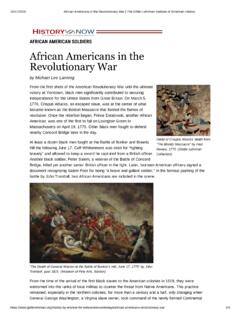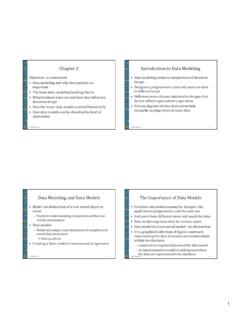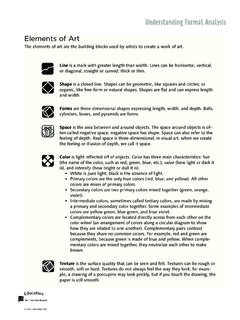Transcription of Moral Reasoning: Lawrence Kohlberg
1 LP 9C Moral reasoning 107/07/04 Moral reasoning : Lawrence KohlbergAccording to Kohlberg , there are 3 levels with 2 stages each ofmoral reasoning . Each stage is defined by the reason/motive foryour 1: Preconventional: No internalization of morals (reasonsare external to the individual) Stage 1 (Punishment and obedience) Stage 2 (Individual self-interest)Level 2: Conventional: Intermediate internalizations of morals Stage 3 (Seeking approval or avoiding disapproval) Stage 4 (Law and order)Level 3: Postconventional: full internalization of morals Stage 5 (Interpretation of the law) Stage 6 (Universal ethical principles)In Kohlberg s theory of Moral reasoning your decision is not thecritical issue it is the reasons for your decision. These stagesunfold in an age-related step-by-step fashion, much like Piaget sstages of cognitive 9C Moral reasoning 207/07/04 Moral reasoning : The Moral Dilemma of Heinz In Europe, a lady was dying because she was very was one drug the doctors said might save her.
2 Thismedicine was discovered by a man living in that sametown. It cost him $400 to make it, but he charged $4000for just a little bit of it. The sick lady s husband, Heinz,tried to borrow enough money to buy the drug. He went toeveryone he knew to borrow the money. But he could onlyborrow half of what he needed. He told the man who madethe drug that his wife was dying, and asked him to sell themedicine cheaper or let him pay him later. But the mansaid No, I made the drug and I am going to make moneyfrom it. So Heinz broke into the store and stole the Heinz have stolen the drug? Why or why not?The point of Kohlberg s work is that the specific answer yes orno is not what matters. Instead, the important issue is the typeof Moral reasoning that underlies the 9C Moral reasoning 307/07/04 Level 1: Preconventional: no internalization of morals (reasonsare external to the individual)Stage 1: (Punishment and Obedience) People base their Moral decisionson the fear of punishment.
3 Actions are evaluated in terms of possible punishment, notgoodness or badness; obedience to power is emphasized. Right and wrong is determined by what is punished. People basetheir Moral decisions on the fear of punishment, and thus avoidspunishment. Children obey because adults tell them to : I won t cheat because I will get caught. I won t steal because I will go to jail. I won t speed because I will get a ticket. I ll help you because if I don t, I ll get in 2: (Individual self-interest) Right and wrong is determined bywhat is rewarded. Moral thinking is based on rewards and self-interest--profit motive. Concern for the needs of others is largely a matter of You scratchmy back, I will scratch yours. , not out of loyalty, gratitude orjustice.
4 Right and wrong is determined by what is rewarded or profitable. Children obey when it is in their best interest to : I will cheat because I will get a better score on the exam. I won t tell mom you broke the vase if you don t tell on me forstealing candy. I will tell mom you lied because it makes me look better. I will help you if I get something out of it. Conversely, I m not goingto help you if because there s nothing in it for 9C Moral reasoning 407/07/04 Level:2: Conventional, Intermediate internalizations of moralsStage 3: (seeking approval or avoiding disapproval) Right and wrong isdetermined by seeking approval or avoiding disapproval of people whoare close to you (such as your parents and friends). Good behavior is that which pleases others in the immediate groupor which brings approval.
5 Children often adopt their parent s Moral standards at this stage,seeking to being thought of as a good girl or good boy in frontof those who are close to : I won t cheat on the test because my parents will be ashamed of me. I will steal because it will make me look cool in front of my friends. I will give to charity because everyone will think highly of me. Break the speed limit? Why not you dork? Jaywalking makes you look cool and 4: (Law and Order) Right and wrong is determined by society srules, and laws, which should be obeyed rigidly to maintain law andorder through formal or informal codes of conduct. Moral judgments are based on understanding and the social order,law, and duty. In this stage, the emphasis is on upholding law, order andauthority, doing one s duty, and following social rules.
6 One isobligated to follow societies : I won t cheat because if everyone cheats, it will be difficult foranyone to distinguish between those who understand physics andthose who don t. I won t go speed because it is against the law. If everyone speeds,then our laws are meaningless. You must not shoplift because it is illegal. You shouldn t jaywalk because it is against the 9C Moral reasoning 507/07/04 It is okay for large corporations to make shell companies off inBurmuda to avoid paying taxes because it is legal (it may not be ethical ) The death penalty is legal, so it is okay to have the government killsomeone (but some consider it immoral). We must follow the workplace rules so there is order at the 9C Moral reasoning 607/07/04 Level 3: Post conventional level, full internalization of moralsStage 5: (Interpretation of the law) Right and wrong is determined bysociety s rules, which are viewed as fallible, rather than absolute.
7 As amember of society, you have certain obligations to fulfill. The person understands that laws are important to protect societyand individuals and should be changed or not followed if they failto do so. In some instances, the law may not apply to a particularsituation, especially if it violates some values, such as freedom,individual : Certain assault weapons are illegal (they are defined by , MAC-11, AK-47, Tec-9, etc.). You shouldn t skirtthe law by modifying the illegal weapons and give it a new name andignore the spirit of the law It is important for everyone to contribute their tax money to thegovernment, so it is immoral for companies to have shell companiesin the Caymen islands to avoid paying taxes. Speeding laws are useful in town, but in rural areas, they violate myfreedom to choose the speeds I wish to drive.
8 Laws that prohibit people from stealing and breaking in someone s house are important, butif your survival is at stake, it is okay to break into a cabin in the wilderness for survival withthe intent of compensating the owner later (as in the Alaska bush). I ran a red light because it was 12 midnight, no one was around, andthere was an emergency at home. I ignored the traffic lights to get to the 6: (Universal ethical principles) Right and wrong is determinedby ethical abstract principles that emphasize equality and justice. The person has developed Moral judgments that are based onuniversal human rights. When faced with a dilemma between law and conscience, apersonal, individual conscience is followed. Behavior is directed by self-chosen ethical principles that tend tobe general, comprehensive, or universal; high value is placed onjustice, dignity and 9C Moral reasoning 707/07/04be general, comprehensive, or universal; high value is placed onjustice, dignity and : Lying to the Nazis about the Jews in the basement is alright if it isgoing to save an innocent life.
9 It s okay to not prosecute Nazi intelligence officers because it will prevent the United Statesfrom collecting information on Russia. It s okay not to prosecute American soldiers for war crimes because it would be bad forAmerican morale. Laws that restrict access to the court system should be abolished because they impair aperson s access to justice. LP 9C Moral reasoning 807/07/04 Applying Kohlberg s theory of Moral reasoning to politicaldebates:The following are a list of reasons for the United States to getinvolved in the conflict between Kuwait and Iraq (you couldrelate it to other conflicts or Moral dilemmas).Arguments Against for because it would hurt because our oil isthreatened. because we ll have moremoney for because we can gainsecurity of the oil supply.
10 Because we don t want toappear too because we don t wantthe world to see us asweak. because war is killing andkilling is against the because the has laiddown written resolutionswhich should be upheld. Even though the situationis bad, war is damaging topeople and property andsociety agrees that is the situation is extremeenough that society srights and need to bedefended. Although atrocities havebeen committed, it wouldbe an even greateratrocity to wage evil is on the march, andit would be ethicallywrong to allow it 9C Moral reasoning 907/07/04 Criticisms of Kohlberg s theory of Moral development Kohlberg s early research was conducted with malesubjects and became a basis for Moral reasoning for menand women. In addition, most of the dilemmas involve amale to be resolved by a male with a woman being asubordinate.















